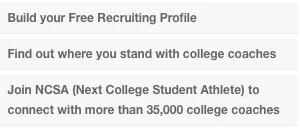How Do Coaches Evaluate Potential Student Athletes?
How Coaches Evaluate Potential Student Athletes
Each coach has their own way of evaluating athletes and gauging how well you will fit in at the college level. That said, while coaches might evaluate recruits a little different, they are all looking at more or less the same things; your current ability, your potential and your ability to handle college life.
How good are you now and can you make an impact immediately?
Coaches are always on the lookout for a recruit who can come in and make an impact for the team as a true freshman, this is your ability. Recruits with a high level of ability are the ones who get the majority of the recruiting attention and typically have several scholarship offers. This type of recruit is rare; the majority of recruits will need time to develop or grow (your potential).
For many colleges academic ability is also important. Meeting the NCAA or NAIA eligibility minimums often isn’t enough to gain admission in to a specific university. Coaches have the ability to help you get through admissions, but they aren’t miracle workers. They know the GPA and SAT or ACT minimums you need for them to have a chance of getting you into the school. if you don’t have the grades, they won’t recruit you.
How good can you be?
If you aren’t the type of recruit to come in and play right away, then you fit into the larger, second category of getting recruited based on your potential. When a coach is evaluating your potential they are looking at your general athletic ability, size and family background. Maybe you are going to need a year or two to grow or develop at a specific position before you will be able to be an everyday player for their team. Because so few athletes can play right away, coaches are always willing to take a chance on a recruit with a lot of potential and you still stand a good chance of getting scholarship offers with a lot of potential.
Many athletes feel like they are playing out of position in high school. Maybe you are one of the biggest players on your high school team but will need to change positions in college. Don’t panic and think you aren’t going to get recruited, just realize you will be recruited on your potential. Focus on playing the best you can at your position and showing a good attitude (this will be important in the last part of the evaluation).
Coaches are also looking at your academic potential. Not every coach and athletic program has the resources to hold your hand through college. Many coaches use the rule of .5. This means your GPA is going to be.5 less in college then it was in high school. So if you were a 2.5 GPA in high school, you won’t be able to maintain your eligibility in college. If you are even close to being an eligibility question, many coaches will simply pass over you in favor or a recruit who won’t have a problem getting the grades.
Will you fit in with the program and adjust to college life?
Coaches have the unenviable task of trying to determine how a 16 or 17 year old is going to handle moving away from home. Almost every recruit will have some issue when moving away from home. Best case scenario for a coach you are staying up too late and need to be reminded of your responsibility to the team and their sport. Worst case (and something that happens more than you think) recruits need to leave the program. Maybe they quit the sport, can’t handle the academics, have an attitude problem or simply just want to go home.
What a coach is looking for here is a recruit who can handle their own responsibilities and shows maturity when it comes to things like social media and relationships with their coaches. Coaches want to hear from the recruit and not the parents when getting emails and phone calls. If a recruit’s parent is handling everything for them in the recruiting process, a coaches experience tells them there could be problems with the recruit being on their own and adjusting to college life. If you are posting inappropriate things on twitter, facebook or instagram, coaches are going to worry you will cause trouble once you are representing their university.
Remember, these are coaches own opinions when evaluating you. If you think you have the potential and a coach doesn’t, move on, getting frustrated about it doesn’t do any good. Your job as a recruit is to work as hard as you can on the field, in the class room and handle your responsibilities. If you do these things, you are going to give yourself the best chance you can of getting recruited.
Do you have questions about your own recruiting? Click on the parent or athlete button below to speak with a recruiting specialist.


